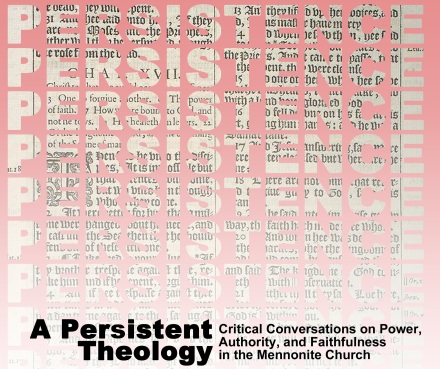Part I and II of Dr. Susanne Guenther Loewen’s talk on gender, violence, Mennonite theology and theories of atonement.
I regret to mention that the last few minutes of the talk were caught off due to technical difficulties. The final section of the talk is pasted below the video links.
Reinterpreted in this way – a way which rejects both the myths of redemptive violence and of the redemptiveness of all suffering, and which speaks to both voluntary and involuntary suffering and which combines the human-ethical dimension with a theology of the cross as divine solidarity with those who suffer unjustly – reinterpreted in this way, the cross can indeed be good news. Alongside other liberative interpretations of the cross, including the historical narrative of Jesus crucified as a consequence of nonviolent resistance to the systemic sins and oppressive empire of his day and the empty cross of the resurrection, the female crucifix or crucified woman can thus be a liberative symbol.
And the Crucified Woman sculpture in Toronto has functioned this way for many women, particularly in connection with the Montreal Massacre. Doris Jean Dyke describes how in 1989, upon hearing of the massacre of fourteen young engineering students – all women – eering students of Canada sat the Ecole Polytechnique in Montreal, shot by a man who declared himself anti-feminist, hundreds of people gathered around the sculpture of the Crucified Woman. In light of such blatantly misogynistic violence, people were drawn to this sculpture of a suffering woman – depicted nude and sorrowful, with arms outstretched in a cruciform shape – to express their anger and grief, to remember the victims, “some to pray, many to weep.” Vigils for the victims of the Montreal Massacre were held there in 1989 and in subsequent years.[1] These gatherings and vigils around the Crucified Woman were clearly not meant to glorify misogyny, and while on one level, they facilitated lament for tragedy, there was an additional dimension to them. Dyke writes, the “feeling of being abandoned and vulnerable was shared and talked about and yet all were standing together, committed to end the needless suffering of women.” In another similar instance, “[a] battered wife, told her social worker that when she saw the Crucified Woman she was able to relate to Christ for the first timeorm of strength for resistance which can be gleaned from the cross.ll were standing together, committed to end the n.”[2] According to Dyke, it is here, at the foot of this cross, that “[w]omen [can see…] their suffering, their dying, and their resurrection embodied in a woman’s body” and “know that their suffering is gathered up into the suffering of Christ.”[3] This clearly speaks to a different kind of “power in the blood,” to use Terrell’s terms,[4] a form of healing and strength for resistance which can be gleaned from the cross – in other words, it speaks to a redemptive aspect of the cross, in which God has not turned away from the suffering particular to women, but knows their pain and desires their liberation. Thus, as Grey explains, “Christa liberates not by . . . proclaiming that there is an innate redemptive quality in [women’s suffering]; but by being present with and sharing in the brokenness, identifying this as the priority for God’s healing love, Christ gives hope, empowers, and enables the process of resistance.”[5] Surely this is good news.
[1] Doris Jean Dyke, Crucified Woman (Toronto: United Church Publishing House, 1991), 67, 69-70.
[2] Ibid., 73. Cf. 76.
[3] Ibid., 2. Cf. 44-45, where she writes, “Some people have said, ‘Don’t you know that Jesus was a man?’ Yes, indeed Jesus was a man and he was a Jew. Artists have sometimes presented the Christ figure as African, Asian, and Native American, but more often white. Always as a man, seldom as a Jew. So finally, the question surfaces: Why not as a woman?” Sandra Schneiders has likewise argued, “Christ, in contrast to Jesus, is not male, or more exactly not exclusively male. Christ is quite accurately portrayed as black, old Gentile, female, Asian or Polish.” Quoted in Beattie, “Sexuality and the Resurrection of the Body,” 136.
[4] JoAnne Marie Terrell, Power in the Blood? The Cross in African American Experience, 2nd ed. (Eugene, OR: Wipf and Stock, 2005).
[5] Mary Grey quoted in Julie Clague, “Symbolism and the Power of Art: Female Representations of Christ Crucified,” in Bodies in Question: Gender, Religion, Text, ed. Darlene Bird and Yvonne Sherwood (Burlington, VT: Ashgate, 2005), 49.

